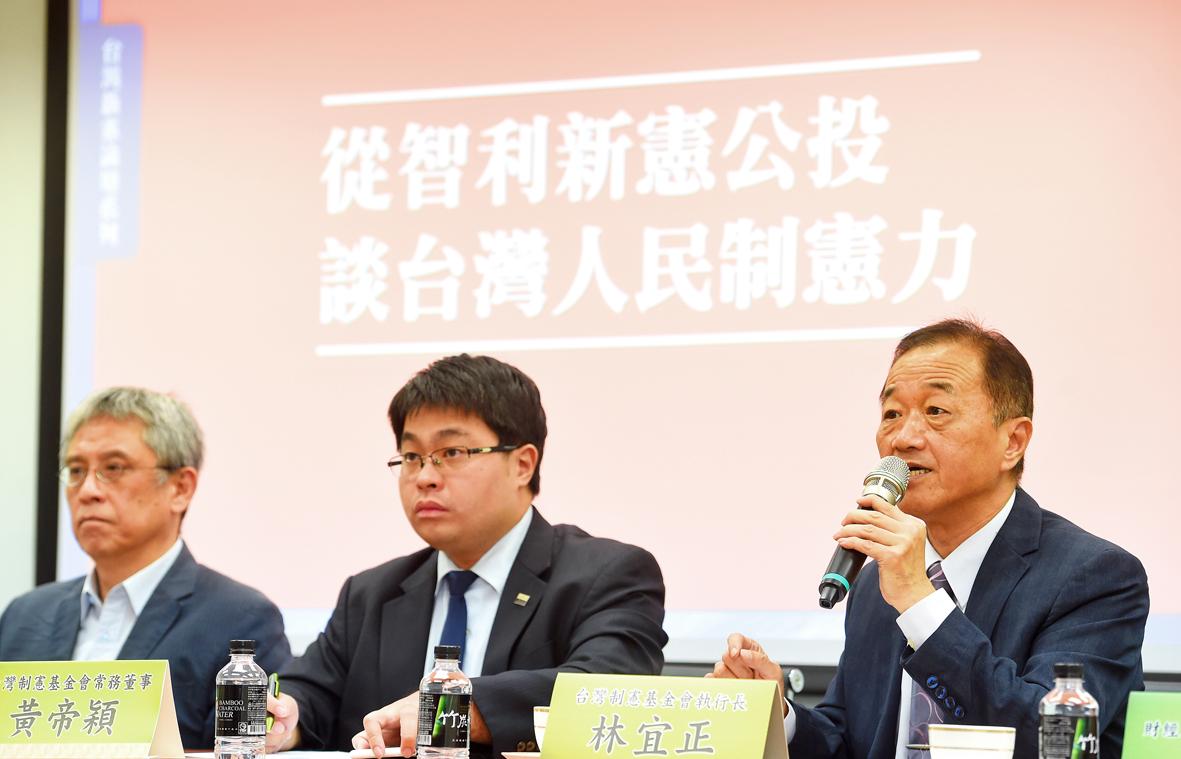Experts at a forum organized by the Taiwan New Constitution Foundation in Taipei yesterday compared constitutional reform efforts in Chile and Taiwan, saying that the Legislative Yuan’s newly formed committee on the issue would “accomplish nothing.”
Chileans on Oct. 25 voted on whether to draft a new constitution to replace the one written during the military dictatorship of General Augusto Pinochet, and if so, which type of government a constitution should stipulate.
More than 78 percent of voters supported drafting a new constitution, while 79 percent preferred a government elected entirely by popular vote, rather than splitting the decision with the legislature.

Photo: Liu Hsin-de, Taipei Times
Chilean society has experienced severe economic inequality exacerbated by the privatization of healthcare, pensions and other services, said Kung Kwo-wei (宮國威), an associate professor and chairman of the Graduate Institute of Latin American Studies at Tamkang University.
Protests broke out in October last year over a 30 peso (US$0.04) increase in public transportation fares in the Chilean capital, Santiago, and the protests, which gradually developed into widespread unrest, reflected the society’s long-standing inequities, Kung said.
The South American nation is run like a large corporation with a government that neglects its social responsibility, he added.
Unlike Chile, a similar referendum proposal brought by the foundation was rejected by the Central Election Commission last month, foundation executive director Lin Yi-cheng (林宜正) said.
The election commissions reasons for rejecting the proposal were outrageous, including its statement that changes to the Constitution could be made through amendments and writing a new one was therefore unnecessary, he said.
The commission also said that only a nonbinding consultative referendum would be possible, but said that the proposal’s wording, “Do you support the president in pushing for the establishment of a new constitution reflecting the reality of Taiwan?” would be confusing for voters, he added.
The threshold for amending the Constitution is also too high, Lin said.
He expects that the Legislative Yuan’s ad hoc Constitutional Amendment Committee, formed last month, would “accomplish nothing.”
Taiwanese are not determined enough, Lin said, adding that talk of amending or drafting a new constitution is empty without first convincing the people of how closely their lives are intertwined with the nation’s premier legal document.
A previous attempt to revise the Constitution during the eighth legislative session failed because of different groups looking to “bind together” different interests, said Lo Cheng-chung (羅承宗), director of the Institute of Financial and Economic Law at Southern Taiwan University of Science and Technology.
For example, support for lowering the voting age to 18 was also tied to support for absentee voting and other proposals, he said.
History would repeat itself, Lo said, but reiterated the importance of drafting a constitution that more accurately reflects the nation’s situation.

A preclearance service to facilitate entry for people traveling to select airports in Japan would be available from Thursday next week to Feb. 25 at Taiwan Taoyuan International Airport, Taoyuan International Airport Corp (TIAC) said on Tuesday. The service was first made available to Taiwanese travelers throughout the winter vacation of 2024 and during the Lunar New Year holiday. In addition to flights to the Japanese cities of Hakodate, Asahikawa, Akita, Sendai, Niigata, Okayama, Takamatsu, Kumamoto and Kagoshima, the service would be available to travelers to Kobe and Oita. The service can be accessed by passengers of 15 flight routes operated by

GIVE AND TAKE: Blood demand continues to rise each year, while fewer young donors are available due to the nation’s falling birthrate, a doctor said Blood donors can redeem points earned from donations to obtain limited edition Formosan black bear travel mugs, the Kaohsiung Blood Center said yesterday, as it announced a goal of stocking 20,000 units of blood prior to the Lunar New Year. The last month of the lunar year is National Blood Donation Month, when local centers seek to stockpile blood for use during the Lunar New Year holiday. The blood demand in southern Taiwan — including Tainan and Kaohsiung, as well as Chiayi, Pingtung, Penghu and Taitung counties — is about 2,000 units per day, the center said. The donation campaign aims to boost

ENHANCING EFFICIENCY: The apron can accommodate 16 airplanes overnight at Taoyuan airport while work on the third runway continues, the transport minister said A new temporary overnight parking apron at Taiwan Taoyuan International Airport is to start operating on Friday next week to boost operational efficiency while the third runway is being constructed, the Ministry of Transportation and Communications said yesterday. The apron — one of the crucial projects in the construction of the third runway — can accommodate 16 aircraft overnight at the nation’s largest international airport, Minister of Transportation and Communications Chen Shih-kai (陳世凱) told reporters while inspecting the new facility yesterday morning. Aside from providing the airport operator with greater flexibility in aircraft parking during the third runway construction,

American climber Alex Honnold is to attempt a free climb of Taipei 101 today at 9am, with traffic closures around the skyscraper. To accommodate the climb attempt and filming, the Taipei Department of Transportation said traffic controls would be enforced around the Taipei 101 area. If weather conditions delay the climb, the restrictions would be pushed back to tomorrow. Traffic controls would be in place today from 7am to 11am around the Taipei 101 area, the department said. Songzhi Road would be fully closed in both directions between Songlian Road and Xinyi Road Sec 5, it said, adding that bidirectional traffic controls would